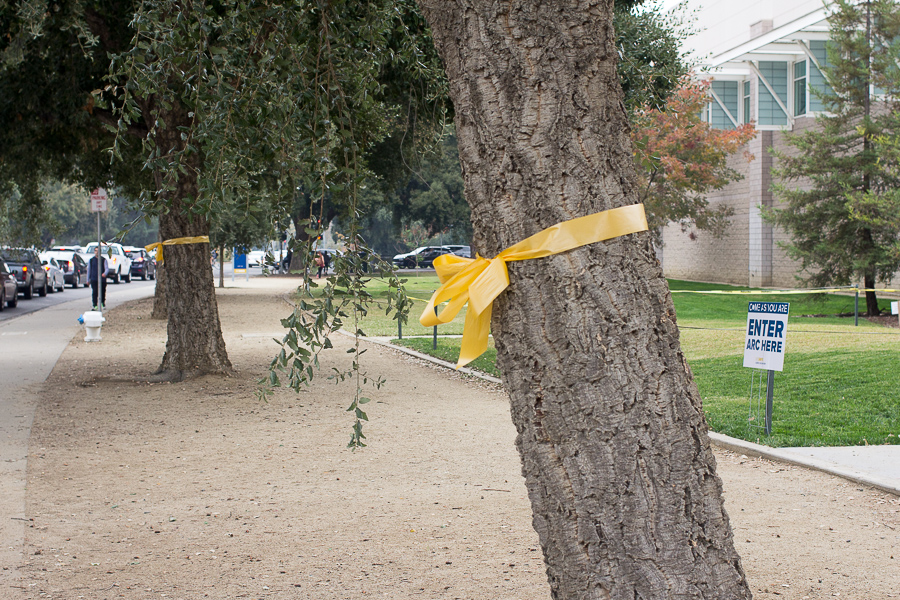
Veterans Success Center holds events for Veterans Week, offers year-round resources
For students who have served in the military, the college experience can be radically different than that of other students. One challenge faced by student veterans, though, is something that a lot of new students might relate to.
“Most [student veterans] are transfer students, transferring from community colleges where they’re under a semester system, and then coming to a quarter system here at Davis,” said Earl Raehsler, the coordinator of the Veterans Success Center (VSC). “They’re kind of getting that shock of, ‘Wow, we’re in the third week and we’re already at midterms, are you kidding me?’”
Veterans Week took place from Nov. 6 to 11, culminating on Veterans Day with the “Salute to Heroes” Aggie football game. On the Nov. 6, the VSC held an event in which they tied yellow ribbons to some of the trees on the Quad, in recognition of service members and veterans.
Many students might not know about the VSC, which is tucked away on the second floor of the Memorial Union. But it serves several important roles for student veterans. It helps with administrative problems and paperwork, provides a quiet space to get away from the crowds of campus and offers a way to connect with other veterans. Many students receive benefits from the GI Bill, and the VSC is there to help them work through the technicalities.
“For the GI program that we’re in, there’s a lot of paperwork you have to do,” said
David Mott, a third-year plant science major and a peer advisor at the VSC. “There are a lot of moving parts, and [the VSC staff] know everything about it, so it’s a great resource to have.”
But beyond this technical help, the VSC can help students with adjustments to college life, and to some of the specifics of life as a student veteran.
“Some of it is just adjustments to balancing life,” Raehsler said. “[Veterans] are a little bit older, some of them have families, some of them are commuting to school, they have different stuff going on in their lives compared to a freshman coming in straight from high school.”
Raehsler also cautioned against some of the stereotypes and assumptions that exist about veterans, which can create tension.
“There are some struggles when it comes to […] UC Davis being a very liberal school, and the perception that’s out there that all military members are conservative, or we all think a certain way,” Raehsler said. “We’re not necessarily conservative, we’re not necessarily liberal, we don’t have the luxury while we serve to really look at it that way […] so when [veterans] come here, and they’re coming as students, and they get labeled a certain way without faculty or staff or fellow students really knowing how they feel. It’s difficult for them.”
These challenges mean that many student veterans appreciate the VSC as a place where they can be with others who share some of the same difficulties. The VSC office, which is entirely open to student veterans, provides them with a place to study or to talk.
“I use [the VSC] for coming in and relaxing,” said Alex Johnson, a third-year chemistry major. “I do homework next door in the study room, the kitchen that we’re able to use is really helpful when I bring my lunches. Being able to connect with other students that aren’t necessarily older is a little more difficult, which is why I spent most of my time here. It’s really important for me to have a connection with other students that are going through the same things.”
Another venue for connections between student-veterans is the Davis Student Veterans Organization (DSVO), a student-run club which is the local chapter of Student Veterans of America.
“We do philanthropy and get-togethers and events […] it’s really about the sense of community,” said Edgar Garcia, a fourth-year biological anthropology major and the president of the DSVO.
Cody Bynes, a third-year political science major, said that both the DSVO and the VSC can help with the difficulties of being a student-veteran.
“Davis is good to us, with [the VSC], and other resources and financial aid,” Bynes said. “I won’t say we have it harder than anyone else, but we definitely have some challenges […] it’s good to have a place where we can use some of our military lingo, and hang out with other veterans who might understand what we’re going through.”
Written by: Gabriel Mulcaire — features@theaggie.org



